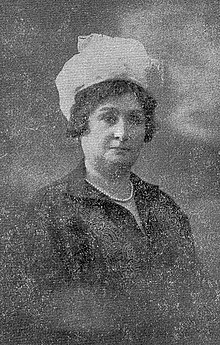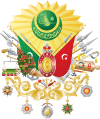Emsalinur Kadın
| Emsalinur Kadın | |||||
|---|---|---|---|---|---|
 | |||||
| Born | 2 January 1866 Tbilisi | ||||
| Died | 1952 (aged 85–86) Istanbul, Turkey | ||||
| Burial | Yahya Efendi Cemetery, Istanbul | ||||
| Spouse | |||||
| Issue | Şadiye Sultan | ||||
| |||||
| House | Ottoman (by marriage) | ||||
| Father | Ömer or Mehmed Bey | ||||
| Religion | Sunni Islam | ||||
Emsalinur Kadın (Ottoman Turkish: امثال نور قادین; "exemplary light"; 2 January 1866 – c. 1952; after the Surname Law of 1934: Emsalinur Kaya) was the seventh consort of Sultan Abdul Hamid II of the Ottoman Empire.[1]
Early life[edit]
Emsalinur Kadın was born in 1866 in Tbilisi.[2] Her father was either named Ömer Bey,[3] or Mehmed Bey.[4] She had a younger sister named Tesrid Hanım, who in 1894, married Şehzade Ibrahim Tevfik, son of Şehzade Burhaneddin, and grandson of Sultan Abdulmejid I. Emsalinur was known for her beauty and grace.[2]
Marriage[edit]
Emsalinur married Abdul Hamid in 1885 in the Yıldız Palace,[2] and was given the title of "Fifth Kadın". On 30 November 1886, a year after the marriage, she gave birth to her only child, a daughter, Şadiye Sultan.[5] In 1895, she was elevated to the title of "Fourth Kadın". In 1901, she was elevated to the title of "Third Kadın". She built a mosque in Kırkpınar in 1907 and was gifted a mansion in Nişantaşı, where she lived after her husband's deposition.[3]
On 27 April 1909, Abdul Hamid was deposed, and sent into exile in Thessaloniki.[6] Emsalinur didn't followed him, and so remained in Istanbul.[7] After Thessaloniki fell to Greece in 1912, Abdul Hamid returned to Istanbul, and settled in the Beylerbeyi Palace, where he died in 1918.[8]
Widowhood and death[edit]
In 1924, the Imperial family was sent into exile. Emsalinur followed her daughter to Paris. However, after a staying few years there, she returned to Istanbul, and settled in her mansion located in Nişantaşı.[2]
In 1934, in accordance to the Surname Law, she took the surname "Kaya".[2] After her mansion was sold by the ministry of finance, Emsalinur settled in her granddaughter's mansion located in Erenköy known as "Galip Paşa Mansion".[2] However, after this mansion was also sold to Sabiha Gökçen, the world's first female fighter-pilot, in 1948, Emaslinur became homeless.[2]
The government had allocated her one hundred liras per month. And with this amount of money it became difficult for her to rent a house. Emsalinur Kadin died homeless in 1952, at the age of approximately eighty-six,[2] and was buried in Yahya Efendi Cemetery, Istanbul.[9] Her daughter outlived her by twenty-five years, dying in 1977.[10]
Issue[edit]
| Name | Birth | Death | Notes |
|---|---|---|---|
| Şadiye Sultan | 30 November 1886[11][12][13] | 20 November 1977[11][12][13] | married twice, and had issue, one daughter |
See also[edit]
References[edit]
- ^ Uluçay 2011, p. 248.
- ^ a b c d e f g h "Abdülhamid'in 82 yaşında evsiz ve parasız kalan hanımı, devletten bir evde 'bekçilik etme' izni istiyor!". Habertürk. 13 August 2017. Retrieved 2 May 2020.
- ^ a b Çevrimli, Nilgün. Terms of Defining Women in Foundations from the Founder, Social Status, and Family Relation. p. 269.
...Sultan Abdülhamid Han hazretlerinin dördüncü kadını ve sultân-ı müşârun-ileyhin vâlide-i muhteremeleri devletlü ismetlü Emsalnur Kadınefendi hazretleri ibni′l-merhûm Ömer Efendi...H 1334 (M 1915).
- ^ Akyıldız, Ali (2018). Son Dönem Osmanlı Padişahlarının Nikâh Meselesi. p. 701.
- ^ The Concubine, the Princess, and the Teacher: Voices from the Ottoman Harem. University of Texas Press. 2010. p. 289. ISBN 978-0-292-78335-5.
- ^ Hall, Richard C. (October 9, 2014). War in the Balkans: An Encyclopedic History from the Fall of the Ottoman Empire to the Breakup of Yugoslavia. ABC-CLIO. pp. 1–2. ISBN 978-1-610-69031-7.
- ^ Osmanoğlu 2000, pp. 157–158.
- ^ Parry, Milman; Lord, Albert B. (1979). Serbocroatian heroic songs, Volume 1. Harvard University Press. p. 371.
- ^ Sakaoğlu 2008, p. 682.
- ^ Sakaoğlu 2008, p. 693.
- ^ a b Osmanoğlu 2000, p. 263.
- ^ a b Uluçay 2011, p. 256.
- ^ a b Brookes 2010, p. 289.
Sources[edit]
- Brookes, Douglas Scott (2010). The Concubine, the Princess, and the Teacher: Voices from the Ottoman Harem. University of Texas Press. ISBN 978-0-292-78335-5.
- Osmanoğlu, Ayşe (2000). Babam Sultan Abdülhamid. Mona Kitap Yayinlari. ISBN 978-6-050-81202-2.
- Sakaoğlu, Necdet (2008). Bu Mülkün Kadın Sultanları: Vâlide Sultanlar, Hâtunlar, Hasekiler, Kandınefendiler, Sultanefendiler. Oğlak Yayıncılık. ISBN 978-6-051-71079-2.
- Uluçay, M. Çağatay (2011). Padişahların kadınları ve kızları. Ötüken. ISBN 978-975-437-840-5.


